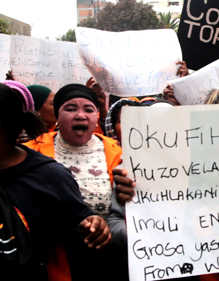
What Corruption Watch finds strange, though, is that the probe is being overseen by an in-house municipal agent – and not by a more appropriate inter-ministerial committee. Read our press release here.
All the while, the real victims have been the programme’s workers on the Mvula sites, the poorest of the poor.
In January this year Corruption Watch uncovered fronting in a R30-million tender won by Mvula Trust to manage the distribution of hundreds of millions of rand through the Community Work Programme – a communities-based job-creation project.
Our four-month investigation, sparked by a tip-off from a whistleblower, uncovered grave irregularities in the awarding of the Mvula Trust tender and found that the trust had been used as a front, seemingly so that a strategically connected company could reap the benefits of the contract.
The findings were handed over to the Department of Cooperative Governance in January.
In March there were unconfirmed reports of late payments made to the Community Work Programme beneficiaries. Paying beneficiaries was the responsibility of Mvula Trust. In addition, the amounts in the payments, didn’t stack up.
On two occasions this year beneficiaries have taken to the streets to protest against late payments by Mvula.
“The major element of the contract involves paying hundreds of millions of rands in wages to those working in the Community Work Programme, the poorest of the poor”, Corruption Watch director David Lewis said in March this year.
“The danger was always that a firm prepared to acquire the contract irregularly would not make good on the actual deliverables in the contract.”
In late March Baloyi finally acknowledged that not all was right with Mvula Trust and government’s multibillion-rand Community Work Programme, and announced that a full-scale investigation would be done.
Probe details make Corruption Watch ‘uncomfortable’
While there has been little in the news on the scandal since Baloyi’s announcement in March, yesterday an anonymous source leaked Corruption Watch details of the minister’s investigation – including its terms of reference. The minister wants the probe to be finalised within two months.
In the leaked document, the Municipal Infrastructure Support Agent (Misa) – a new state entity subordinate to Baloyi’s department – is named as the body that will oversee the probe.
“We’re uncomfortable with the decision to give the Municipal Infrastructure Support Agent responsibility to oversee the investigation. Misa is a barely formed state entity that reports directly to Baloyi, whose ministry and department is a key subject of the investigation,” Lewis said yesterday.
“Given this, we would have thought it more appropriate that this investigation should report to the inter-ministerial committee responsible for overseeing the Community Work Programme.”
He added: “While we welcome this news of the planned investigation, what is regrettable of course is that if the minister and the department had responded timeously to our investigation report, the hardship suffered by those workers on the Mvula sites – who were forced to take to the streets to secure their wages – may have been avoided.”
Corruption Watch will monitor the probe to ensure it’s conducted transparently, the outcome is made public and consequences should flow the findings.
“We will provide the inquiry with the fruits of our ongoing investigation,” Lewis said.

